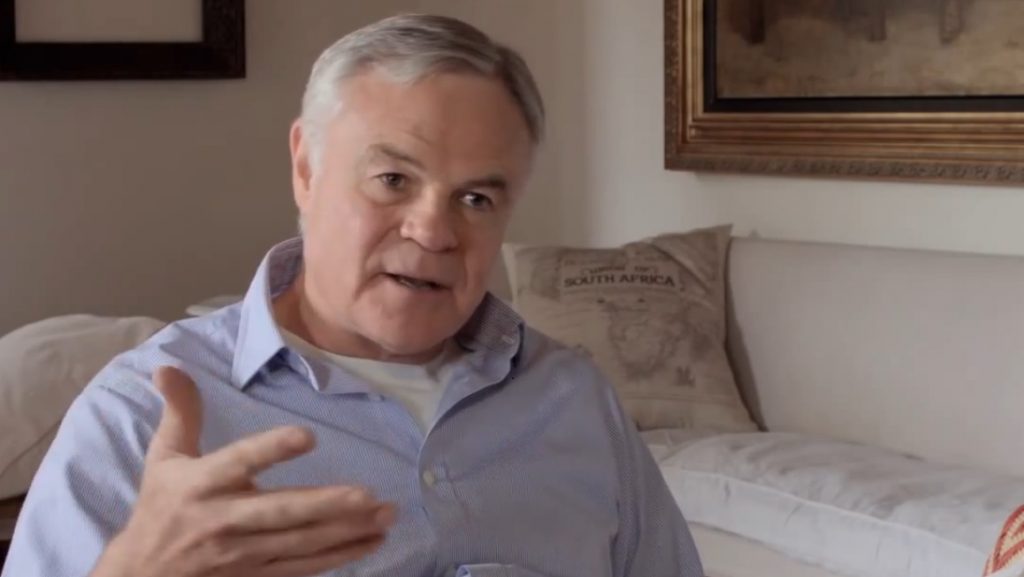Have you ever wondered how much easier travel has become, thanks to the digital innovations shaping our world? Exploring new destinations used to mean…
Do you want to treat Naspers like a small family business? [Opinion]

(In response to former Pricecheck CEO Andre de Wet’s opinion piece earlier this week, Johann van Tonder — who once served as Naspers Labs head — argues that it’s wrong to believe Koos Bekker sold out SA by focusing the business mainly on foreign markets — Ed)
Koos Bekker stood up and clinked his glass. The dozen or so university students, seated at the dinner table around him, settled down.
“Before the next course,” he said, “please share with me your thoughts on the limitations of the internet.”
This was 1998. South Africans were just getting connected to the internet. Naspers was making its first moves into that space, guided by Bekker (pictured above) who had recently become Naspers CEO.
As each dinner guest would sing for their supper, Koos scribbled notes. A few words underlined, others had circles around them. Occasionally he’d ask a clarifying question.
Three courses, three topics. Several pages of scribbles.
In the last financial year, foreign businesses contributed 84% of total revenue for Naspers, up from 80% the year before
I was in that room as one of two youthful Naspers representatives. I found it all delightfully quirky, but it struck me this was as close as Koos could get to digital “natives” at the time.
I think it must have helped to put him one step ahead of the pack. He was trying to understand the changing world, getting his information at source, unfiltered.
Thinking global
Eleven years later, I saw a version of this at a Naspers CEO conference. It was held in Tokyo for various reasons. Partly it was to expose us to the Japanese market. They embraced “mobile first” when we thought of phones as devices for making calls.
Koos figured this immersion exercise would give us a taste of the (mobile) future so we could prepare for it. These were constant themes with Koos. Big picture. Think global. Eye on the future. Get out of the building, with apologies to Steve Blank.
CEOs of various Naspers divisions from around the world flew in for this. No more than 20 of the 100 or so delegates were South African.
The format was varied, but included lots of debate. One topic, super sensitive and involving a key South African division, was discussed for a solid few hours.
Koos was quiet throughout the session, again scribbling notes feverishly as some of the best business minds and accomplished entrepreneurs in the world weighed in. At the very end he got up and briefly summarised the discussion, covering all the salient views.
Finally, he shared his own view. “Folks, I think you’ve missed the point entirely.” As he explained his reason for saying this, heads were nodding.
The problem was this: the debate was about the future — but from the perspective of today. Like watching a movie about 2019 made in the 80s. Now that we know what the future looks like, those scenes from 2019 are clearly set in the 80s.
The recommendation that came out of that group discussion was spot on, but five years too late, Koos pointed out. We were debating the only future we could see, imagining a 2019 set in 2009. Koos was thinking beyond that.
The world he projected that day at the end of this marathon session became true, more or less. He absolutely didn’t have any influence over it.
It was a shift in the market that he saw coming and that the rest of us hadn’t spotted. To be clear, these were some of the smartest people you could hope to ever meet. I think it’s simply a case of Koos having a more complete picture, informed by a broader view and exposure to a variety of sources of information.
Globalisation is a fact, De Wet
The opinion piece of former Naspers colleague Andre De Wet (see the piece here) reminded me of this.
“Appointing Bob van Dijk as CEO of Naspers was the biggest mistake Koos Bekker could have made for SA …” writes De Wet. And the parting shot: “Koos, if you’re reading this, it’s time to step up and do the right thing.”
The right thing, according to the article, is to stop the planned listing of Naspers in the Netherlands.
De Wet is a bright guy, an accomplished entrepreneur and advisor with an outstanding reputation. But, like the rest of us in that room in Tokyo in 2009, he has an incredibly narrow view of the world compared to Koos Bekker. He can’t see the complete picture. And his imagined future is a futuristic version of 2019.
The central argument of De Wet’s piece goes something like this: “Naspers was started by South Africans for South Africans”.
Koos came along and grew the company, using money that was “the fruits of the labour of thousands of South Africans”. By appointing Van Dijk, he has given away this South African asset to a foreigner.
To get to this point, the article takes a few twists.
Referring to Bob Van Dijk, he writes: “A senior manager at eBay with a background in management consultancies such as McKinsey and others. And for some reason Bekker thought he’s the best man for the job…”
Even on that scant information, it sounds like a decent track record. The facts are that Van Dijk had been in senior management at global brands in the ecommerce and online classifieds space. Since these are key playing fields for Naspers, I imagine it’s exactly what made him so uniquely qualified for the top job.
De Wet continues: “Van Dijk is not someone that’s ever created something or run a large corporate. Furthermore, he’s a really boring speaker and uninspiring leader.”
Ignoring the punchline (surely it wasn’t meant to be taken seriously), is the suggestion here that creating “something” and running a large corporate are the main criteria for this job?
On that basis, even the supremely talented and highly regarded Antonie Roux himself may not have qualified. De Wet laments “… unfortunately Antonie Roux passed away. He was to be the natural successor to Bekker…”
Incidentally, it’s true that Antonie was widely regarded to be take over from Koos. However, as early as 2009 there were strong rumours that the next CEO would be a foreigner.
In my view this globalisation is a key point missed by De Wet. When Koos stepped into Naspers in 1997, it was a relatively large South African media operation. By the time he handed over the reins, it had been transformed into a global giant internet and tech investment firm.
That growth did not come out of South Africa. On the contrary, the local footprint is tiny compared to the rest of the world.
In the last financial year, foreign businesses contributed 84% of total revenue, up from 80% the year before. It operates in more than 130 countries.
Why on earth, Andre De Wet, do you want to treat Naspers like a small family business?
Johann van Tonder spent 15 years at Naspers, reporting to Koos Bekker for four years as general manager of Naspers Labs, before he left in 2011.
Read more: The silent Naspers coup: how Koos Bekker gave away the family jewels [Opinion]
Featured image: Naspers chairman Koos Bekker (Future of Media and Advertising via Youtube)


